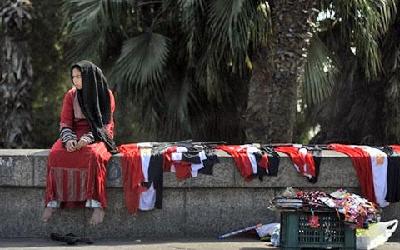
Egyptians will vote Saturday in a referendum on changes to the constitution, the first in a series of steps meant to carry out reforms demanded in a popular uprising.
US Secretary of State Hillary Clinton got to see first-hand the continued push for change in Egypt, driving past a crowd of demonstrators seeking economic betterment Wednesday outside the prime minister's office.
Earlier in the day, she walked through Tahrir Square, the heart of the uprising that prompted an end to the old order last month.
"It's just a great reminder of the power of the human spirit and universal desire for freedom and human rights and democracy," Clinton said.
But she also noted the work ahead is "like drinking from a fire hose": there is much yet to be done, and the United States is ready to help in every way possible.
First on the agenda is a referendum on constitutional change Saturday - simple yes or no votes on whether to approve amendments that open up the political system somewhat, or reject them outright.
Many in the opposition movement plan to say no. They argue the proposed changes are half-measures at best, and mock the spirit of the Tahrir demonstrations.
The vote is the first hurdle in the path of change, with parliamentary then presidential votes slated to go ahead in the next six months.
American diplomats have expressed concern. A State Department official says the compressed time frame for the votes, especially in a country that hasn't had a "proper" political process in 30 years, is daunting.
Sa'id Sadek, a professor at the American University in Cairo, says that while things may seem complicated, there are also reasons to be optimistic.
"Politics in Egypt these days is fluid. We see actions by fundamentalists, by many trends that might look disturbing. At the same time, there is also a counterweight force emphasizing secularism and civil society," Sadek stated.
Sadek also stresses that however strategic US interests are in Egypt that should not interfere with the business at hand. "The transitional period needs technical advice and assistance from friendly states like the United States. Mind you, the Egyptian revolution was not about foreign policy at all. It was about domestic policy: ending corruption, ending torture, ending a police state, ending a mafia state. It was not about Egyptian foreign relations with Israel or the United States or Europe or any foreign power," Sadek said.
As the United States plays a delicate balancing act in its relations with protesters across the region, people like Sadek have a simple message for Washington: these movements are about internal reform, and help should be limited to that.
Egyptian pyramids reopen for tourism
High food prices helped spark Egypt protests
Despite talks in Egypt, protests continue
What it was like in Tahrir Square when Mubarak resigned
(来源:VOA 编辑:崔旭燕)
